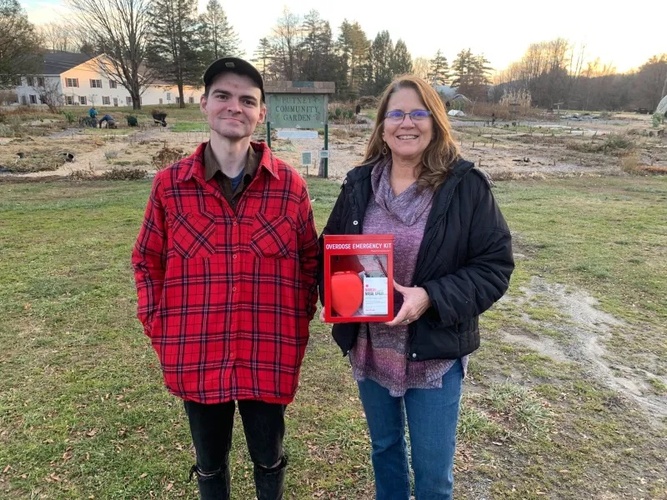PUTNEY — Robin Rieske arrived to town with five overdose emergency kits. The red metal boxes with a glass front resembled a square version of a small fire extinguisher cabinet. But rather than putting out flames, the tools inside could reverse an opioid overdose.
Two hours later, Rieske had distributed the day's supply - a fraction of the 175 boxes she and colleagues have helped hand out in recent years to businesses and community groups across southeastern Vermont.
Her work is part of a coalition of groups called Community Substance Use Response, or CSUR, a collaborative effort focusing on substance use prevention, harm reduction, treatment, and recovery in Windham County.
Windham County has the second highest rate of overdoses for its population size, trailing only the comparatively tiny Essex County, according to data from the Vermont Department of Health.
While Brattleboro, Windham County's largest town, displays the county's opioid epidemic most visibly, nearby rural areas deal with the same issues.
"In Brattleboro, it's public," said Dakota Roberts, a harm reduction specialist with the AIDS Project of Southern Vermont, who was working alongside Rieske in Putney late last month. The rural areas around the town have more "functional addicts," he noted - people who are employed, housed, and may be able to more easily hide their drug misuse.
"It's hidden, but it's here," he said.
Through his harm reduction work, Roberts has tested about 200 drug samples, checking for substances like fentanyl and the animal tranquilizer xylazine. During that process, he tries to engage in conversations with whoever has brought him the drugs, directing them toward recovery and harm-reduction resources.
"When they're able to be safe and clean and know what they're taking, they will," Roberts said.
On this late November day, Roberts and Rieske had no trouble convincing local business owners to carry the overdose-reversing drug Narcan.
At the Putney Diner, Owner Eleni Maksakuli welcomed the overdose kit. In the past, the diner had an employee in recovery from opioid misuse, she said, who wound up relapsing while still employed.
Maksakuli wondered what more she could have done to help the former employee, and whether the paycheck from the diner only enabled the person.
"You feel like you fail," she said.
Roberts was quick to dispel her regrets. A job gives a person in recovery stability and connections, he said. Unemployment, in his experience, would more likely send someone back into using.
Maksakuli also suspects people sometimes make use of the diner's bathroom as a place to do drugs. "What can you say, 'You can't use our bathroom'?" she asked.
The emergency kit, which she planned to store where staff could easily access it, would offer a little peace of mind, Maksakuli said.
In rural areas, where people must use a car or rely on an infrequent transit bus to reach everyday needs, the barrier to accessing substance-use-disorder services is much higher than in urban areas, said Elias Klemperer, a co-director at the University of Vermont's Center on Rural Addiction and an assistant professor of psychiatry and psychological science.
"Just by definition of being rural, there are often fewer providers around," he said. "It makes increasing access to harm reduction even more important."
Klemperer divided resources into two primary categories: treatment and harm reduction.
Treatment includes medications for opioid use disorder like methadone and Suboxone, highly regulated drugs that people typically can use only through daily trips to a provider or limited take-home supplies.
While the treatments are effective in all geographic settings, people prescribed the drugs in rural communities often face a larger burden to access them, Klemperer noted.
In Windham County, Brattleboro has a methadone clinic, but residents in the northern and western parts of the county have a lengthy trip to reach it. The state is in the process of seeking proposals for a new methadone site potentially in southern Vermont, which could provide easier access to medication.
Harm reduction, according to Klemperer, includes resources like clean needles, drug-checking supplies, and Narcan - the work Rieske and Roberts were pursuing in Putney.
At each stop - like the town's food co-op and the library - the pair provided a quick rundown on how to respond to an overdose. First, call 911, they said. Before administering Narcan, check whether the person is breathing, they said.
The overdose-reversing medication, they assured everyone, would not cause harm if the person wasn't overdosing on an opioid.
Each emergency kit they distributed includes two doses of Narcan, a face mask for rescue breathing, information on how to access recovery resources, and a copy of Vermont's good samaritan law, which helps protect someone responding to a suspected drug overdose from legal repercussions.
After three decades in state government, Rieske has enjoyed spending the last year outside it. Her departure has allowed her more flexibility to pursue projects without navigating a bureaucracy.
"It allows me to not have to justify my work," she said.
Yet, working outside of government presents new challenges, too. Community Substance Use Response relies on fundraisers, donors, and grants, so money can be tight. A source of state funding that helped sustain the organization is drying up, Rieske said.
In October, Rieske made a presentation about the group's work to Vermont's Opioid Settlement Advisory Committee. The committee has since invited Community Substance Use Response to submit a budget for how Rieske and her organization could use a portion of that pot of state dollars.
Where exactly CSUR's funding will come from going forward remains up in the air. But Rieske will continue helping those affected by opioids - that much is clear.
This News item by Ethan Weinstein originally appeared in VtDigger and was republished in The Commons with permission.
